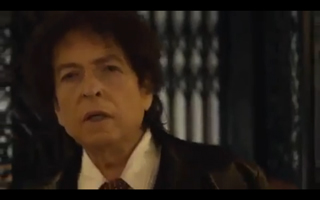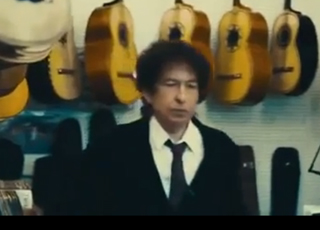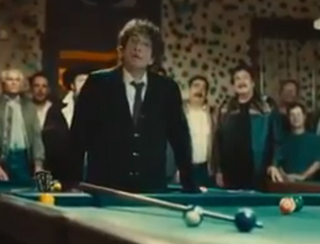By Mark Ellis

To a legion of faithful fans – especially those rhapsodized by his Christian period — there was shock and chagrin during the Super Bowl to see Bob Dylan hawking Chryslers like any other celebrity pitchman.
In a truly lopsided, lackluster Super Bowl, the commercials and the half-time show became ‘the thing.’ So Dylan’s appearance stood out amid the rabble, but for the wrong reasons to many diehard fans. Many cried foul as his musical legacy was also tainted by a commercial on the same night for Chobani yogurt.

It was not his first appearance in a televised ad. In 2004 he sold out to a Victoria’s Secret ad – heralding a wayward diversion in his rocky road to Christian sanctification. That ad – with Dylan and his pencil-moustache looking too old for the pairing with a scantily clad model — utilized his 1997 song “Love Sick.”
Alas, his Super Bowl auto ad wasn’t even Dylan’s first appearance in a car commercial. He shot an ad for the Cadillac Escalade in ‘07, which paraded him at the wheel of the sport utility vehicle. That one got a few people miffed, signaling his apparent disregard for artistic purity.
During the late 1970s, Dylan famously converted to Christianity. According to Pastor Kenn Gulliksen, “Larry Myers and Paul Emond went over to Bob’s house and ministered to him. He responded by saying, ‘Yes, he did in fact want Christ in his life.’ And he prayed that day and received the Lord.”
His nascent Christian period was reportedly influenced by Al Kasha, a Brooklyn-born composer, songwriter and arranger. Kasha started a weekly Bible study in his home attended by Hollywood actors.

Dylan began to attend Kasha’s Bible study, coming every week for six months. “Bob was, at that time, going through a spiritual search and if you look at his track record as a writer, he was always seeking after Jesus and he finally realized that Jesus was his Savior,” Kasha noted.
One night Dylan prayed the “sinners prayer” (a second time?) with Kasha and Clark and Ceil Mathias. Ceil has a vivid memory of that evening. “After Al Kasha asked him if he wanted to receive Jesus into his life, he said, ‘Yes I do, yes I do, yes I do,’ and that was that.”
Kasha says Dylan wrote his whole entire ‘Slow Train Coming’ album in front of his fireplace.
In the early 80s, Dylan backed away from the “born again” label. He told Kurt Loder of Rolling Stone magazine: “I’ve never said I’m born again. That’s just a media term. I don’t think I’ve been an agnostic. I’ve always thought there’s a superior power, that this is not the real world and that there’s a world to come.”
While some say they commune with God in the natural world, Dylan told Newsweek in 1997 he found religiosity in music. “Songs like “Let Me Rest on a Peaceful Mountain” or “I Saw the Light”—that’s my religion. I don’t adhere to rabbis, preachers, evangelists, all of that. I’ve learned more from the songs than I’ve learned from any of this kind of entity. The songs are my lexicon. I believe the songs.”
In a 2009 interview with Bill Flanagan promoting Dylan’s Christmas album, Flanagan said Dylan gave a “heroic performance” and that he “delivered the songs like a true believer.” Dylan replied: “Well, I am a true believer.”
Comforting, perhaps, to those who think he’s lost his way or tarnished his image. Perhaps the iconoclast is merely keeping every observant follower guessing, as always.




“Shock and chagrin” from a “legion of faithful fans” who were “confounded” — says who? And based on what? Sure, it was surprising if not a little shocking to see The Man Media Could Not Buy doing a commercial late in life for Chrysler. But the tone of your story implies: 1) a grave moral lapse into unimaginable sin — and this from the man famous for not “selling out,” and 2) multitudes of the “faithful” mourning their fallen hero’s egregious sin, based on…uh…the fact that YOU felt that way, and maybe some of your buddies? Hey, come on, lighten up. The guy needed a few extra bucks. No harm, no fowl. It was a classy ad, and Dylan hardly came across like a “celebrity pitchman.” We the faithful are bemused and a little puzzled, but not in mourning. The article feels hyperbolic and opportunistic, cashing in on “Dylan commercial” keywords many will be searching today. But worst of all, it seems unkind, and an example of Christians publicly attacking Christians, to the benefit of…no one. Dylan has never done what his fans wanted, which is part of his charm. Take the money and run, Bob.
Todd, thanks for your response. I concur it was NOT “a grave moral lapse or unimaginable sin.”
I also agree it was filmed artistically. But Dylan is in an elite category of superstars who defined a prophetic voice for his generation.
I can’t imagine Picasso selling Volkswagens, John Lennon as a spokesman for big Pharma, or Bono selling weight loss products.
There are some things that diminish one’s moral voice and authority, but that’s only one opinion, and I respect yours.
I am not ‘confounded’ by Bob Dylan’s appearance in a car ad, or any other ad. For all I know he has stock in Fiat (or Chrysler).
What I am confounded by is how believers can be awed by a mere human just because he achieves some sort of fame in the culture. Mr. Dylan has no more answers to the big questions in life than you or I. He puts his socks on one foot at a time and the only one deserving of our exaltation is Jesus Christ.
Mr. Dylan may be a nice guy or may be jerk, but who really cares what he does. I have struggles of my own.
I met a woman on staff with a major Christian ministry who believes that Dylan is one of the two witnesses in the Book of Revelation.
I don’t take him that seriously, but some people do. I wholeheartedly agree that Jesus alone is worthy of exaltation.
I agree. These celebrities poop too. I get sick of the idolization.
Didn’t see the Ad. I guess that’s why I can ask: ‘Was the labourer worthy of his hire’ – doing ads is a job of work is it not?
Comments are closed.